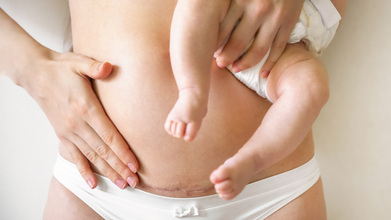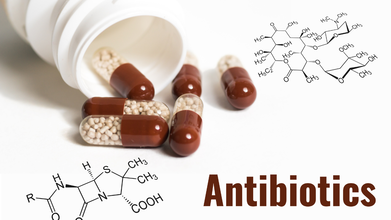- Health Conditions A-Z
- Health & Wellness
- Nutrition
- Fitness
- Health News
- Ayurveda
- Videos
- Medicine A-Z
- Parenting
- Web Stories
Period Blues? Here's Why It’s Beyond Your Control

Credits: Canva
More than only physical discomfort is frequently experienced during menstrual periods. Emotional symptoms like melancholy, impatience, and worry might also take center stage, even if headaches, cramps, and exhaustion are typical. Some people experience similar mood changes before, during, or even after their period finishes, and they might mimic sadness. But have we ever thought about why there are mood swings in the first place and how we can deal with them effectively?
The answer to why is because the female body changes every week due to the menstrual cycle, which has four phases. These four phases disrupt hormones, which can affect the mood.
Turns out that mood swings are not just limited to menstruation or PMS, it changes throughout the menstrual cycle. A menstrual cycle consists of four different phases follicular phase, ovulation, luteal phase, and menses.
Follicular Phase
The follicular phase starts when you begin your menstrual cycle and lasts for about 14 to 21 days, this overlaps with your menses, which is when you are on your period. This means body secretes follicle-stimulating hormone, it does not have a say in your mood, and only helps eggs to grow.
Menstruation
While menses means that uterine blood and tissues comes out through vagina. Right before your period, you may feel blues or sick, an indication that your period is approaching. While on period the feelings of anxiety remains.
Ovulation
Ovulation is when the egg is matured and is released. This is when your oestrogen levels are at peak and it improves your mood, energy and also increases sex drives.
Luteal
The luteal phase is when the follicle left behind by the departing egg secretes progesterone, this increases cravings, lowers anxiety and improves sleep. However, when the egg is left unfertilized, the progesterone levels fall and leads to PMS.
The Connection Between Hormones and Mood
According to experts, hormonal fluctuations throughout the menstrual cycle have a significant influence on mood swings, as oestrogen and progesterone levels vary, impacting serotonin and dopamine—two critical brain chemicals involved in mood modulation.
An Overview of the Menstrual Cycle Phase
- Menstrual Phase: Bleeding starts, hormone levels are at their lowest, and symptoms might get worse.
- Follicular Phase: Hormone levels steadily increase as the body gets ready to ovulate, sometimes elevating mood. Oestrogen levels increase throughout the ovulation phase and subsequently rapidly decrease.
- Luteal Phase: Progesterone increases and then swiftly drops if pregnancy is not obtained, causing mood swings. Many people may develop emotional instability and depressive symptoms as a result of this hormonal roller coaster.
Does It Go Beyond PMS? Investigating the Root Causes
Even while irritation and bloating are typical PMS symptoms, extreme emotional anguish may indicate more serious problems:
PMDD, or Premenstrual Dysphoria: A more severe kind of PMS characterised by mood swings, anxiety, and sadness. Symptoms commonly interfere with daily activities, demanding medical treatment.
PME (premenstrual exacerbation)
Anxiety, melancholy, and bipolar disorder are some of the mental health conditions whose symptoms may be aggravated by hormone variations.
These illnesses can occasionally be misdiagnosed, thus symptom tracking is critical for effective therapy.
Getting Relief: Effective Treatment Options
If period-related sadness is interfering with your life, there is treatment available.
Counselling and Therapy:
Cognitive-behavioral therapy teaches coping techniques for dealing with stress and mood changes.
Additionally, treatment may disclose the underlying reasons of depression.
Supplements and Medication:
SSRIs, or antidepressants, have been shown to reduce PMDD symptoms.
Hormonal Therapy: Birth control tablets can help keep hormone levels constant.
Natural cures Supplements like calcium, magnesium, vitamin B6, and others may be helpful.
Lifestyle Modifications:
- Exercising makes you cheerful and less stressed.
- Relaxation techniques including journaling, meditation, and breathing techniques might help you feel less stressed.
- Social support can help, and you may feel less alone if you talk to your loved ones.
You Know Your Body Best:
You may be able to see patterns and direct your encounters with medical providers if you record your symptoms throughout your cycle. A more precise diagnosis can be made if you write down your experiences and bring it to appointments.
Fact Check: Does Age Really Lower Your Fertility? Here’s What Experts Say

Credits: Canva
More Americans are waiting longer than ever to start families. In fact, birth rates among women in their early 30s have surpassed those of women in their late 20s for the seventh straight year in 2022. The number of births among women aged 40 and older is also on the rise, government data shows.
This trend challenges the long-held belief that getting pregnant becomes nearly impossible or too risky with age. However, fertility specialists say the truth is more layered. To understand it better, we spoke with Dr. Akta Bajaj, Obstetrics & Gynaecology, Ujala Cygnus Group of Hospitals, who helped clear up some of the biggest misconceptions.
Can Age Really Affect Your Fertility?
For many years, experts have blamed declining egg quality as the main reason for reduced fertility with age. But new findings from UC San Francisco and the Chan Zuckerberg Biohub San Francisco suggest that there’s more to it. The study, supported by the National Institutes of Health (NIH), reveals that the cells and tissues surrounding the egg also play a major role in how eggs mature and how fast fertility declines.
According to Dr. Randi Goldman, Program Director of Reproductive Endocrinology and Infertility at Northwell, while fertility naturally drops with age, it’s a gradual change rather than a sudden one. Many women in their 30s are still capable of conceiving without assistance. Data shows that the odds of pregnancy in a single menstrual cycle are around 25% for women in their 20s, about 20% by age 30, and roughly 15% by age 35 — which Dr. Goldman notes is still quite reasonable.
Myths Around Age and Fertility
Dr Bajaj told us that fertility comes with its own set of facts and myths, and she told us some myths around fertility that everyone should note:
Myth 1: Fertility Declines Only After 35
Fact: Fertility doesn’t suddenly drop at 35, it starts to dip slowly in the late 20s and early 30s. By the mid-30s, this decline becomes more noticeable, and after 37, it tends to speed up. While chances of conception decrease gradually, many women in their 30s still conceive naturally and have healthy pregnancies. It may take a little longer, but it’s often still achievable.
Myth 2: Modern Medicine Can Reverse Age-Related Fertility Decline
Fact: Treatments like IVF can improve the chances of pregnancy but can’t completely undo the effects of aging. As a woman ages, egg quality drops, which affects embryo growth and lowers IVF success rates. IVF relies on a woman’s own eggs, and if those eggs are older, embryos may not develop as well. Donor eggs can increase success rates, but no medical procedure can reverse the natural aging of the ovaries.
Myth 3: Men’s Age Doesn’t Matter
Fact: Men also experience age-related fertility changes, though more slowly. Sperm count, movement, and DNA quality begin to decline after 40, which can make conception harder and slightly raise the risk of miscarriage or certain developmental disorders. The risk remains small but becomes more visible as men get older.
Myth 4: You Can Always Freeze Eggs and Conceive Later
Fact: Egg freezing gives women flexibility but is not a guaranteed path to pregnancy. Success largely depends on the age at which eggs are frozen. The ideal time is before 35 when eggs are typically healthier. Freezing eggs at an older age can result in fewer viable embryos and lower chances of success. It’s a helpful option, but not a sure solution.
Myth 5: If You’re Healthy, Age Doesn’t Matter
Fact: Good health supports fertility but can’t completely overcome the effects of aging. Regular exercise, nutritious eating, and avoiding smoking or heavy drinking can help reproductive health, but they don’t stop the biological changes that occur in eggs and sperm as we age.
In short, while age does play a role in fertility, it doesn’t mean pregnancy is impossible after your 30s. Experts agree that understanding your body and seeking timely guidance can make all the difference when planning parenthood later in life.
C-Section Births Can Lead To Sleep Problems And Severe Pain: Study

(Credit-Canva)
New research suggests that mothers who give birth by C-section (cesarean delivery) are more likely to have two major problems afterward: severe pain that disrupts sleep and daily activities, and a higher chance of developing sleep problems.
This study, presented at the ANESTHESIOLOGY 2025 annual meeting, highlights a crucial issue. People often forget how important sleep is when a mother is recovering. Sleep is key to a new mother's mental and physical health. The severe pain and lack of sleep linked to C-sections can cause big issues like postpartum depression, trouble thinking and remembering things, and extreme tiredness. All of this can make it harder for the mother to bond with her baby and have good relationships with family.
What Is A C-Section Birth?
According to Mayo Clinic, a C-section aka (cesarean delivery), is a surgery used to deliver a baby. It involves making surgical cuts (incisions) in the mother's belly and uterus to take the baby out.
A C-section may be planned ahead of time if the mother has certain complications during pregnancy, or if she has already had a C-section before. However, for a mother's first baby, the decision to do a C-section is usually made after labor has already started.
If you are pregnant, understanding the reasons for a C-section and what to expect during recovery can help you feel more prepared. Health professionals might recommend a C-section for several important reasons.
A C-section may be needed if labor stalls, the baby is under stress, or is in an unusual position (breech/transverse). Other reasons include carrying multiples, problems like placenta previa or cord prolapse, a physical blockage, the mother's serious health issues, or a past C-section.
How Is Health Affected After Childbirth?
The research included two main parts: talking to mothers (qualitative analysis) and analyzing a large database (quantitative analysis). For the first part, researchers interviewed 41 new mothers about their pain and sleep. They found a striking difference based on the delivery method:
Over two-thirds of mothers who had a C-section (both planned and unplanned) reported severe pain that made it hard to sleep and do daily tasks.
In comparison, only 8% of mothers who had a vaginal birth reported this level of severe, disruptive pain.
Can You Develop A Sleeping Disorder After C-Section?
For the second part of the study, researchers looked at a national insurance database containing information from more than 1.5 million mothers who gave birth between 2008 and 2021.
This analysis showed that mothers who had a C-section were 16% more likely to be diagnosed with a new sleep disorder (such as insomnia, sleep deprivation, or sleep apnea) between one month and one year after delivery, compared to those who delivered vaginally.
The lead author, Moe Takenoshita, M.B.B.Ch., from Stanford University, stressed the importance of managing pain well, especially for C-section recovery, since untreated pain worsens sleep. To help improve sleep, mothers can try several measures:
- Manage pain adequately with medication.
- Exercise regularly (as soon as it’s safe to do so).
- Sleep when the baby sleeps (napping during the day).
- Avoid caffeine or alcohol late in the day.
- Relax before bed with activities like taking a bath or practicing deep breathing.
Dr. Takenoshita noted that about one-third of all U.S. births are C-sections. She advised that anyone planning a C-section should understand the link to more severe pain and a higher risk of sleep problems. She urged all new mothers with sleep issues to discuss their concerns with their doctor for advice or a referral to a specialist.
WHO Warns Antibiotic Resistance Is Becoming A Widespread Issue: What Is Causing This Resistance To Common Medication

A major new report from the World Health Organization (WHO) has delivered bad news: one out of every six serious infections confirmed in labs worldwide last year could not be killed by the antibiotics meant to treat them.
Between 2018 and 2023, the problem of antibiotics failing (called resistance) got much worse. For many common types of germs, resistance went up by 5% to 15% every year. The growing inability of these essential medicines to work is a huge threat to people everywhere.
What is Antibiotic Resistance?
According to the National Foundation for Infectious Diseases, antibiotic resistance happens when bacteria learn to withstand the medicines(antibiotics) that are supposed to kill them. It's like the bacteria have developed a suit of armor against the drug.
When this happens, doctors have to switch to different antibiotics. These backup medicines might not work as well or might cause more side effects. Sometimes, a bacteria can become resistant to all available drugs, which leaves the patient with a dangerous infection that doctors have no way to treat. The alarmingly is that these tough, drug-resistant bacteria can spread from one person to another, both in hospitals and at home.
What Antibiotics Are People Becoming Resistant To?
The WHO's latest report is the most detailed look yet at this issue. It reports on how much resistance exists across 22 different antibiotics—the common drugs used to treat everyday illnesses. The report focused on eight common types of bacteria that cause things like:
- Urinary tract infections (UTIs)
- Stomach and intestinal infections
- Dangerous blood infections
- The sexually transmitted disease gonorrhoea
These germs include well-known ones like E. coli and the bacteria that cause staph infections.
Where Is Antibiotic Resistance A Big Problem?
The risk of antibiotics failing is not the same worldwide. It's highest in Southeast Asia and the Eastern Mediterranean, where one in three reported infections were resistant. In the African region, it was one in five. Resistance is also more common and getting worse in places that don't have good hospitals or labs to quickly find out what type of bacteria is causing an illness and what drug might work.
Dr. Tedros Adhanom Ghebreyesus, the head of the WHO, said that the rise of this resistance is "outpacing advances in modern medicine," putting families' health at risk. He urged everyone to use antibiotics carefully, and stressed the need for better tests, newer medicines, and stronger systems to prevent infections in the first place.
How Does Antibiotic Resistance Cause Us Problems?
The report warns that a type of bacteria known as Gram-negative bacteria is becoming the most dangerous threat globally. The countries least able to fight these infections are being hit the hardest.
- Two types, E. coli and K. pneumoniae, are the most common drug-resistant germs found in life-threatening blood infections. These infections can quickly lead to the body shutting down and death.
- Globally, the standard, first-choice antibiotic is failing against over 40% of E. coli and over 55% of K. pneumoniae.
- In Africa, resistance to this key antibiotic is now higher than 70%.
Even the last-resort, powerful antibiotics that doctors save for only the worst cases are starting to fail. These "last-resort" drugs are often very expensive and hard to find, especially in poorer countries, leaving doctors with no good options.
Can We Resolve This Issue?
On a positive note, more countries are starting to report data to the WHO's tracking system (called GLASS). The number has grown from 25 countries to 104 countries in the last seven years.
However, almost half of the world’s countries still didn't report data last year, and many that did still don't have good enough systems to track the problem accurately. Often, the countries that need help the most are the ones that can’t measure their own problem.
The WHO is urging all countries to work together to fight this by strengthening health systems and tracking resistance in people, animals, and the environment. The goal is for every country to report good-quality data on antibiotic resistance by 2030 so the world can clearly see the problem and decide how to fix it.
© 2024 Bennett, Coleman & Company Limited

